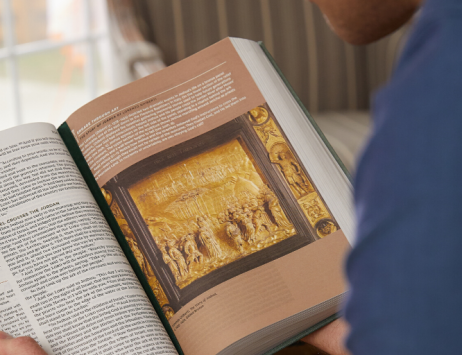Journaling Scripture is distinct from journaling to record daily life. A Scripture journal is not meant to be primarily a diary or a log of daily events. Though all journaling is useful for general mental health and spiritual growth, journaling can become richer when integrated with Scripture.
Journaling Scripture helps you to reflect on a passage, focusing your mind and helping you concentrate. Writing often helps us clarify our thinking. Most of us, when we take notes for a class or during a sermon, engage with the content at a deeper level and remember it more completely—and, as a result, the content has more impact on our lives. This same principle holds true when you journal Scripture. Writing down your thoughts about a passage helps you to engage the Bible more deeply.
Journaling Scripture is not just about a better understanding of the content of the Bible; it can also help increase your expectation of meeting God in His Word. In Spiritual Disciplines for the Christian Life, Donald Whitney writes, “By slowing us down and prompting us to think more deeply about God, journaling helps us feel more deeply (and biblically) about God. It provides an opportunity for the intangible grays of mindwork and heartwork to distill clearly into black and white. Then we’re better able to talk to God with both mind and spirit.” A Scripture journal is a conversation with God. It is meant to be a place where you can safely record and reflect on your raw thoughts and feelings, ask questions, search for patterns, and develop your own thoughts with the Holy Spirit as your guide. Being candid with God and yourself deeply enhances spiritual growth. Confession to God results in an open and honest relationship with him that allows the Spirit to continue to shape and mold you into Christ’s image.
One of the blessings of Journaling Scripture is that years later, when you reread your journal entries, you will be able to see more clearly God’s work in your life. You’ll be able to rediscover a passage of Scripture that was important to you. You’ll remember that God answered a prayer that was prompted by Scripture you wrote in your journal. You’ll realize that questions that weighed on your heart for years have been answered by God. Remembering all that God has done for you on your spiritual journey is one important aspect of spiritual growth. Journaling Scripture can help you remember God’s faithfulness.
What Journaling Scripture Looks Like for You
After reading a passage of Scripture, basic Scripture Journaling could include the following steps:
- writing verses that stood out to you
- jotting questions about the passage
- writing a truth from the passage
- writing action steps for yourself based on your reading
- writing a praise to God for a promise that was meaningful to you
- writing prayers for yourself or others that were prompted by the passage
- writing a confession because you’ve fallen short of an action in the passage
- asking God for help in living out a passage
Methods for Scripture journaling are varied, and there is not one that is universally “correct.” Your method is appropriate if you notice God using your journaling to develop spiritual growth in your life. Be honest in your journaling; search your soul and be open to God’s voice. Eventually, your journaling style will become personal and unique, which is exactly as it should be. The goal is not to follow a strict pattern but to express yourself, seek clarity, and most importantly, to experience growth and new depth in your relationship with God.
Some tips for Journaling
- Consider your options when choosing a journal. You may wish to write directly in the margins of your Bible, on a blank sketchpad, or in a lined or unlined journal. You could even use a 3-ring binder. Carry a few sheets of loose-leaf paper wherever you go so you can jot down any thoughts or insights you gain throughout your day.
- Make sure you are free to be totally honest with yourself and God in your journaling. Also, be sure that others around you are willing to respect the privacy of your journal. Hide your journal in a safe place if you need to. It is important that you are able to write without worrying about who else might read it.
- Choose a time and place for journaling that is comfortable and free of distractions. Your physical space and posture can greatly affect your ability to learn and focus! Simple things like a comfortable chair, sitting up straight and good lighting can all make a difference in your journaling experience.
- Use your journal to clear your mind of distracting thoughts before diving into Scripture. Write down any worries or distractions, perhaps as a prayer, as a way of giving them over to God before you begin reading.
- Express your heart to God and interact with His Word in whatever way best suits you. Journaling is not just about writing! Perhaps you are a visual learner who responds to colors and pictures. Try using artwork to depict a Scripture passage to better understand the story.
- Don’t become overly dependent on your journal. Sometimes we need to simply enjoy being with God in His Word and allow him to speak to us without the aid of pen and paper. If you are prone to over-journaling, set a time limit for yourself before you begin.
 The Abide Bible: Engage Scripture, Engage God.
The Abide Bible: Engage Scripture, Engage God.
Do you yearn for life-giving, intimate communion with God? The Abide Bible is designed to help you experience the peace, hope, and growth that come from encountering the voice and presence of God in Scripture. Every feature in Abide is designed to teach and develop Scripture-engagement habits that help you know the power and spiritual nourishment of abiding in Christ.






1 reply on “Abide: Journaling Scripture”
Wow, thanks for this article, you have just confirmed something very powerful for me. I have been journaling for years without me knowing that I am because I always felt like I am not supposed to write my thoughts down about what I see and hear when I am with the Lord. I journal in a way as if I am writing an article or I am telling a story to someone about what I just read. This takes different shapes and forms sometimes I find myself getting strange titles from what I am learning sometimes it is just a long monologue with no real structure. I have written and written for years and have many topics that the Holy Spirit guided me through. I have taken into taiping lately and I have developed an even faster way to type as thoughts come. I enjoy this kind of journaling and I found a perfect software that imitates a journal or a book with sections, pages etc. Microsoft Onenote is a perfect tool for me to do this and it makes storing my stuff easy, I do not have to worry of it getting lost or it getting damaged by water etc. Your article has opened a window of joy for me and I was strengthened to know what I have been doing is actually one of the tools to help me get closer to know my God. you have blessed me today.